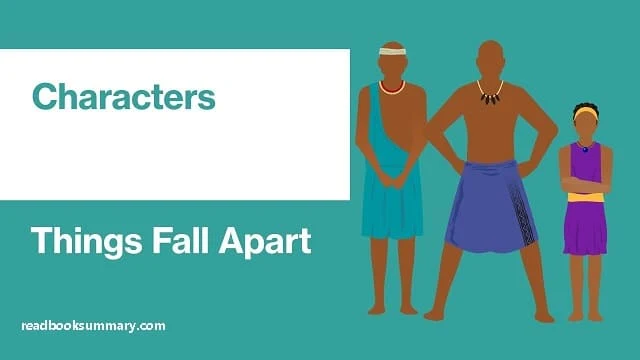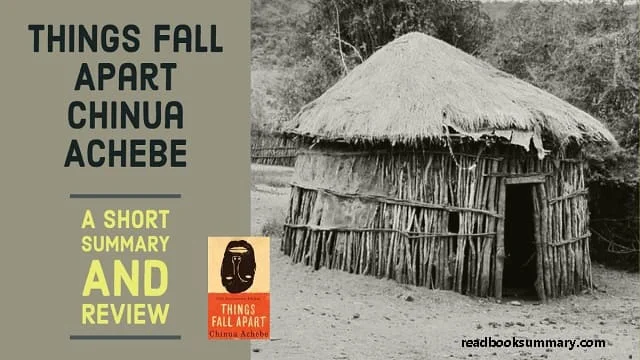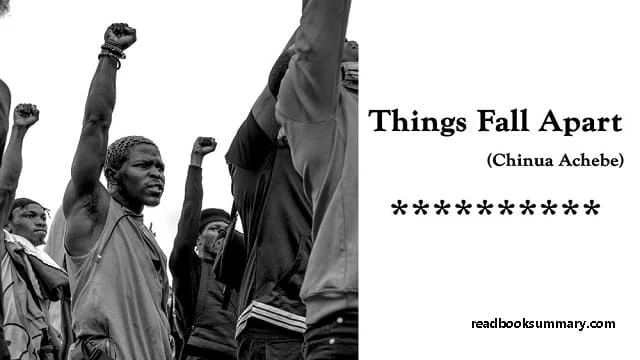Things Fall Apart Summary & Characters List & Themes & Questions and Answers. Things Fall Apart Book is the debut novel by Nigerian author Chinua Achebe, first published in 1958 . It depicts pre-colonial life in the southeastern part of Nigeria and the invasion by Europeans during the late 19th century.
It is seen as the archetypal modern African novel in English, and one of the first to receive global critical acclaim. It is a staple book in schools throughout Africa and is widely read and studied in English-speaking countries around the world. The novel was first published in the United Kingdom in 1962 by William Heinemann Ltd, and became the first work published in Heinemann's African Writers Series.
 |
| Things Fall Apart Summary |
Things Fall Apart Summary
Things Fall Apart is about the tragic fall of the protagonist, Okonkwo, and the Igbo culture. Okonkwo is a respected and influential leader within the Igbo community of Umuofia in eastern Nigeria. He first earns personal fame and distinction, and brings honor to his village, when he defeats Amalinze the Cat in a wrestling contest. Okonkwo determines to gain titles for himself and become a powerful and wealthy man in spite of his father's weaknesses.
Okonkwo's father, Unoka, was a lazy and wasteful man. He often borrowed money and then squandered it on palm-wine and merrymaking with friends. Consequently, his wife and children often went hungry. Within the community, Unoka was considered a failure and a laughingstock. He was referred to as agbala, one who resembles the weakness of a woman and has no property. Unoka died a shameful death and left numerous debts.
Okonkwo despises and resents his father's gentle and idle ways. He resolves to overcome the shame that he feels as a result of his father's weaknesses by being what he considers to be "manly"; therefore, he dominates his wives and children by being insensitive and controlling.
Because Okonkwo is a leader of his community, he is asked to care for a young boy named Ikemefuna, who is given to the village as a peace offering by neighboring Mbaino to avoid war with Umuofia. Ikemefuna befriends Okonkwo's son, Nwoye, and Okonkwo becomes inwardly fond of the boy.
Over the years, Okonkwo becomes an extremely volatile man; he is apt to explode at the slightest provocation. He violates the Week of Peace when he beats his youngest wife, Ojiugo, because she went to braid her hair at a friend's house and forgot to prepare the afternoon meal and feed her children. Later, he severely beats and shoots a gun at his second wife, Ekwefi, because she took leaves from his banana plant to wrap food for the Feast of the New Yam.
After the coming of the locusts, Ogbuefi Ezeuder, the oldest man in the village, relays to Okonkwo a message from the Oracle. The Oracle says that Ikemefuna must be killed as part of the retribution for the Umuofian woman killed three years earlier in Mbaino. He tells Okonkwo not to partake in the murder, but Okonkwo doesn't listen. He feels that not participating would be a sign of weakness. Consequently, Okonkwo kills Ikemefuna with his machete. Nwoye realizes that his father has murdered Ikemefuna and begins to distance himself from his father and the clansmen.
Okonkwo becomes depressed after killing Ikemefuna, so he visits his best friend, Obierika, who disapproves of his role in Ikemefuna's killing. Obierika says that Okonkwo's act will upset the Earth and the earth goddess will seek revenge. After discussing Ikemefuna's death with Obierika, Okonkwo is finally able to sleep restfully, but he is awakened by his wife Ekwefi. Their daughter Ezinma, whom Okonkwo is fond of, is dying. Okonkwo gathers grasses, barks, and leaves to prepare medicine for Ezinma.
A public trial is held on the village commons. Nine clan leaders, including Okonkwo, represent the spirits of their ancestors. The nine clan leaders, or egwugwu, also represent the nine villages of Umuofia. Okonkwo does not sit among the other eight leaders, or elders, while they listen to a dispute between an estranged husband and wife.
The wife, Mgbafo, had been severely beaten by her husband. Her brother took her back to their family's village, but her husband wanted her back home. The egwugwu tell the husband to take wine to his in-laws and beg his wife to come home. One elder wonders why such a trivial dispute would come before the egwugwu.
In her role as priestess, Chielo tells Ekwefi (Okonkwo's second wife) that Agbala (the Oracle of the Hills and Caves) needs to see Ezinma. Although Okonkwo and Ekwefi protest, Chielo takes a terrified Ezinma on her back and forbids anyone to follow.
Chielo carries Ezinma to all nine villages and then enters the Oracle's cave. Ekwefi follows secretly, in spite of Chielo's admonitions, and waits at the entrance of the Oracle. Okonkwo surprises Ekwefi by arriving at the cave, and he also waits with her. The next morning, Chielo takes Ezinma to Ekwefi's hut and puts her to bed.
When Ogbuefi Ezeudu dies, Okonkwo worries because the last time that Ezeudu visited him was when he warned Okonkwo against participating in the killing of Ikemefuna. Ezeudu was an important leader in the village and achieved three titles of the clan's four, a rare accomplishment. During the large funeral, Okonkwo's gun goes off, and Ezeudu's sixteen-year-old son is killed accidentally.
Because the accidental killing of a clansman is a crime against the earth goddess, Okonkwo and his family must be exiled from Umuofia for seven years. The family moves to Okonkwo's mother's native village, Mbanta. After they depart Umuofia, a group of village men destroy Okonkwo's compound and kill his animals to cleanse the village of Okonkwo's sin. Obierika stores Okonkwo's yams in his barn and wonders about the old traditions of the Igbo culture.
Okonkwo is welcomed to Mbanta by his maternal uncle, Uchendu, a village elder. He gives Okonkwo a plot of land on which to farm and build a compound for his family. But Okonkwo is depressed, and he blames his chi (or personal spirit) for his failure to achieve lasting greatness.
During Okonkwo's second year in exile, he receives a visit from his best friend, Obierika, who recounts sad news about the village of Abame: After a white man rode into the village on a bicycle, the elders of Abame consulted their Oracle, which told them that the white man would destroy their clan and other clans. Consequently, the villagers killed the white man. But weeks later, a large group of men slaughtered the villagers in retribution. The village of Abame is now deserted.
Okonkwo and Uchendu agree that the villagers were foolish to kill a man whom they knew nothing about. Later, Obierika gives Okonkwo money that he received from selling Okonkwo's yams and seed-yams, and he promises to do so until Okonkwo returns to Umuofia.
Six missionaries, including one white man, arrive in Mbanta. The white man speaks to the people about Christianity. Okonkwo believes that the man speaks nonsense, but his son, Nwoye, is captivated and becomes a convert of Christianity.
The Christian missionaries build a church on land given to them by the village leaders. However, the land is a part of the Evil Forest, and according to tradition, the villagers believe that the missionaries will die because they built their church on cursed land. But when nothing happens to the missionaries, the people of Mbanta conclude that the missionaries possess extraordinary power and magic.
The first recruits of the missionaries are efulefu, the weak and worthless men of the village. Other villagers, including a woman, soon convert to Christianity. The missionaries then go to Umuofia and start a school. Nwoye leaves his father's hut and moves to Umuofia so he can attend the school.
Okonkwo's exile is over, so his family arranges to return to Umuofia. Before leaving Mbanta, they prepare a huge feast for Okonkwo's mother's kinsmen in appreciation of their gratitude during Okonkwo's seven years of exile.
When Okonkwo returns to Umuofia, he discovers that the village has changed during his absence. Many men have renounced their titles and have converted to Christianity. The white men have built a prison; they have established a government court of law, where people are tried for breaking the white man's laws; and they also employ natives of Umuofia. Okonkwo wonders why the Umuofians have not incited violence to rid the village of the white man's church and oppressive government.
Some members of the Igbo clan like the changes in Umuofia. Mr. Brown, the white missionary, respects the Igbo traditions. He makes an effort to learn about the Igbo culture and becomes friendly with some of the clan leaders. He also encourages Igbo people of all ages to get an education. Mr. Brown tells Okonkwo that Nwoye, who has taken the name Isaac, is attending a teaching college. Nevertheless, Okonkwo is unhappy about the changes in Umuofia.
After Mr. Brown becomes ill and is forced to return to his homeland, Reverend James Smith becomes the new head of the Christian church. But Reverend Smith is nothing like Mr. Brown; he is intolerant of clan customs and is very strict.
Violence arises after Enoch, an overzealous convert to Christianity, unmasks an egwugwu. In retaliation, the egwugwu burn Enoch's compound and then destroy the Christian church because the missionaries have caused the Igbo people many problems.
When the District Commissioner returns to Umuofia, he learns about the destruction of the church and asks six leaders of the village, including Okonkwo, to meet with him. The men are jailed until they pay a fine of two hundred and fifty bags of cowries. The people of Umuofia collect the money and pay the fine, and the men are set free.
The next day at a meeting for clansmen, five court messengers who intend to stop the gathering approach the group. Suddenly, Okonkwo jumps forward and beheads the man in charge of the messengers with his machete. When none of the other clansmen attempt to stop the messengers who escape, Okonkwo realizes that they will never go to war and that Umuofia will surrender. Everything has fallen apart for Okonkwo; he commits suicide by hanging himself.
You may also like to read: Things Fall Apart Book Quotes
Things Fall Apart Themes
Tradition vs. Change: The novel centers around the conflict between Okonkwo's unwavering adherence to Igbo traditions and the rapid changes brought about by British colonialism, Okonkwo represents the old ways, emphasizing the importance of masculinity, hard work, and adherence to custom, The arrival of the white missionaries and their new religion disrupts the equilibrium of Igbo society, challenging Okonkwo's worldview and forcing him to confront the possibility of change.
Colonization and its impact: Achebe vividly portrays the devastating impact of colonialism on Igbo culture, The arrival of the British disrupts traditional ways of life, undermines the authority of tribal leaders, and introduces new laws and customs that clash with Igbo values, Okonkwo's tragic downfall can be seen as a consequence of this cultural collision, highlighting the destructive forces of colonialism.
Family and Community: Family and community play a central role in Igbo society, providing individuals with a sense of belonging and support, Okonkwo's struggles are often rooted in his desire to uphold his family's honor and maintain his status within the community, However, the changing social landscape creates tensions within families and communities, as individuals grapple with the demands of tradition and the allure of new possibilities.
Masculinity and its complexities: Igbo society places a high value on masculinity, emphasizing strength, stoicism, and achievement, Okonkwo embodies this ideal, striving to overcome his own perceived weaknesses and live up to the expectations placed upon him, However, the novel also explores the limitations of this rigid masculinity, showing how it can trap individuals in cycles of violence and ultimately lead to self-destruction.
Language and its power: Achebe's use of Igbo proverbs, folktales, and language reflects the richness and complexity of Igbo culture, Language serves as a means of preserving tradition, transmitting knowledge, and expressing identity, The loss of Igbo language and customs symbolizes the erosion of Igbo culture under colonialism.
Fate vs. Free Will: The novel grapples with the question of whether individuals have control over their destinies or whether they are bound by fate, Okonkwo's belief in his own agency is challenged by the events that unfold, raising questions about the extent to which he is truly free to make choices.
Religion and Spirituality: The novel explores the role of religion in Igbo society, with traditional beliefs contrasting with the arrival of Christianity, Okonkwo's initial resistance to Christianity stems from his fear that it will undermine Igbo customs and traditions, However, the novel also suggests that traditional Igbo beliefs may not offer sufficient answers to the challenges of the changing world.
 |
| things fall apart plot summary |
 |
| summary of the novel things fall apart |
 |
| synopsis of things fall apart by chinua achebe |
Things Fall Apart Characters
- Okonkwo (Oh-kawn-kwoh) The central character of Things Fall Apart. A young leader of the African Igbo community of Umuofia (Oo-moo-oh-fee-ah), he is known as a fierce warrior as well as a successful farmer. He is determined to overcome the stigma left by his father's laziness and wastefulness.
- Unoka (Ooh-no-kah) Okonkwo's father, known for his weakness and lack of responsibility.
- Nwoye (Nuh-woh-yeh) Okonkwo's oldest son, age twelve at the book's beginning. He is innately a sensitive young man.
- Ikemefuna (Ee-keh-meh-foo-nah) A boy of fourteen who is given to Umuofia by a neighboring village to avoid war. He is a clever, resourceful young man.
- Ekwefi (Eh-kweh-fee) Okonkwo's second wife; the mother of Ezinma, her only living child.
- Ezinma (Eh-zeen-mah) Daughter of Ekwefi and Okonkwo; Ekwefi's only surviving child.
- Ojiubo (Oh-jee-ooh-boh) Okonkwo's third wife; the mother of several of Okonkwo's children.
- Obierika (Oh-bee-air-ee-kah) Okonkwo's best friend, who often represents the voice of reason. He is the father of Maduka (son) and Ekueke (daughter).
- Chielo (Chee-eh-loh) A village widow who is also the priestess of Agbala.
- Agbala (Ahg-bah-lah) The Oracle of the Hills and the Caves, who influences all aspects of Umuofian life. She is based on the real Oracle at Awka, who controlled Igbo life for centuries.
- Mr. Brown The first white Christian missionary in Umuofia and Mbanta. An understanding and accommodating man, he is inclined to listen to the Igbos.
- Mr. Kiaga (Kee-ah-gah) The native interpreter for the missionaries. He is a teacher and a leader of the new church in Mbanta.
- The Reverend James Smith A strict, stereotypical white Christian missionary, he takes over the church after Mr. Brown's departure.
- The District Commissioner A stern, stereotypical white colonial administrator of Umuofia. He follows regulations to the letter and possesses little knowledge or understanding of the people for whom he tries to administer a new government.
You may also like to read: No More Mr Nice Guy Book Summary
You may also like to read: One of Us Is Lying Summary
 |
| things fall apart by chinua achebe summary |
 |
| things fall apart chapter summaries |
 |
| things fall apart short summary |
 |
| synopsis of things fall apart |
Questions and Answers about Things Fall Apart Plot
What is the main point of Things Fall Apart? Things Fall Apart is about the connection between the tragic downfall of Okonkwo, who fate and temperamental weakness combine to destroy, and the destruction of his culture and society as the Igbo way of life is assailed by forces they do not understand and are unprepared to face.
What is a brief summary of Okonkwo in Things Fall Apart? Okonkwo is renowned as a wrestler, a fierce warrior, and a successful farmer of yams (a "manly" crop). He has three wives and many children who live in huts on his compound. Throughout his life, he wages a never ending battle for status; his life is dominated by the fear of weakness and failure.
What is the final message of Things Fall Apart? Caught between his rage that the nine villages would succumb to European rule and the futility of fighting the Europeans alone, Okonkwo retreats to his compound and hangs himself. With this act, Okonkwo lives up to his role as a tragic hero whose struggles with society ultimately lead to death.
What does Okonkwo symbolize? In 'Things Fall Apart', the main character, Okonkwo, is often described in terms of fire and flames - his nickname is even 'Roaring Flame' - so, to him, fire symbolizes potential, masculinity, and life. Okonkwo is a lot like a fire, really. He only ever allows himself to show one emotion: anger.
Why is Things Fall Apart a tragedy? Things Fall Apart fits the definition of tragedy because it documents both the personal downfall of Okonkwo and the broader erosion of the Igbo cultural world that Okonkwo wishes to defend.
What are symbols in Things Fall Apart? In Things Fall Apart by Chinua Achebe, some important symbols are the egwugwu, locusts, yams, folktales, fire, and the Mother of the Spirits. Egwugwu are important in the decision-making of Umuofia and represent the clan's very foundation. The locusts symbolize the colonists who come to Umuofia.
What is interesting about Things Fall Apart? The novel has bridged the cultural divides by presenting a narrative that speaks to the African experience. Achebe's novel is considered the first literary work which expresses the colonial experience from the vantage point of the colonized people.
Who killed ikemefuna? Okonkwo kills Ikemefuna because he doesn't want to appear weak in front of his fellow clansmen. Ogbuefi Ezeudu, a village elder, informs Okonkwo that the Oracle has decreed that Ikemefuna must be killed but that Okonkwo should not be the one to kill him, since Ikemefuna regards Okonkwo as a father.
What is the conflict of Things Fall Apart? Major conflict On one level, the conflict is between the traditional society of Umuofia and the new customs brought by the whites, which are in turn adopted by many of the villagers. Okonkwo also struggles to be as different from his deceased father as possible.
What are the 3 parts of Things Fall Apart? The work is split into three parts, with the first describing his family, personal history, and the customs and society of the Igbo, and the second and third sections introducing the influence of European colonialism and Christian missionaries on Okonkwo, his family, and the wider Igbo community.
Why is Okonkwo's death ironic? In Things Fall Apart, the irony is that a proud, successful, and important man such as Okonkwo ends up hanging himself. It's tragic irony because the reader has many hints that this might happen. The reader sees on multiple occasions that Okonkwo doesn't deal well with change.
What does Okonkwo death symbolize? Okonkwo's death comes because he realizes that he has failed both the people and their goddess, Ani. Though he has the spirit to endure misfortunes such as the loss of his yams during the drought that hit Umuofia, the traumas of exile, and the humiliation of imprisonment, he does so with others.
Why did Okonkwo beat his wife? During the Week of Peace, Okonkwo notices that his youngest wife, Ojiugo, has left her hut to have her hair braided without having cooked dinner. He beats her for her negligence, shamefully breaking the peace of the sacred week in a transgression known as nso-ani.
Who is ikemefuna? Ikemefuna is a 15-year-old boy given to the village of Umuofia in exchange for a woman that his father killed. Ikemefuna lives in Okonkwo's home for three years and grows close to Okonkwo's son, Nwoye. Okonkwo grows to love Ikemefuna like a son, and Nwoye loves him as a brother.
Why is Okonkwo a tragic character? Okonkwo is a leader and hardworking member of his community, whose tragic flaw is his great fear of weakness and failure. Okonkwo's fall from grace in the Igbo community lead to suicide, which makes Okonkwo a tragic hero by definition.
